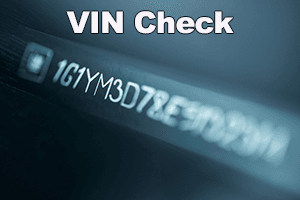NC VIN Number Lookup
Running a North Carolina VIN check is most commonly performed prior to buying a used car. This type of vehicle research can offer an objective overview of a used car's past, any issues that may exist, and a record of its accidents and title history. This is a good way to avoid fraud or sellers that do not disclose all the facts about a car's current status that can potentially affect the safety and overall value of a used vehicle.
An NC VIN check is most commonly completed online with the 17-digit vehicle identification number through either the DMV, or third-party providers. This guide will walk you through how to run an NC VIN lookup, and also explain what they're used for and all the specific information they can reveal. So, if you're in the market to buy a used vehicle, pay attention, because the information we are about to share can be a real game-changer.
Understanding the NC VIN Lookup
A VIN lookup can identify all the important factors surrounding a vehicle's past. It's a valuable resource for car buyers, sellers, and even vehicle owners. Especially in North Carolina, where state-specific resources can streamline the process.
The NC DMV provides multiple options for performing a VIN check. Whether you opt for an online service or visit a local office, the process is standardized. You'll need to fill out and submit a Request for Motor Vehicle Information Form (MVR-605A). The form must be completed, the type of report selected, and the associated fees paid upfront. Then, you'll be able to get an official copy of the vehicle information report, also known as a vehicle history report.
The other option is to use a third-party provider such as a vehicle records website. These resources are privately run and often include more detailed information than what can be obtained from the DMV. One of the benefits of using a non-DMV resource is you do not need to complete a lengthy form, submit it, and wait several days for your results. Most of these third party providers offer instant online access to vehicle history reports which can also include resources that are not offered by the DMV, such as ownership records, title reports, recalls and safety warnings. However, some information may be redacted for privacy reasons such as vehicle owner contact information.
What is a VIN and Where to Find It?
A VIN, or Vehicle Identification Number, is a unique 17-character code. Every vehicle receives this code, which serves as its fingerprint. The VIN encodes specs, options title records, accident reports, manufacturer recalls, and any relevant vehicle records.
Locating the VIN on a vehicle is simple. It's typically found in several locations on the car. Familiarize yourself with where to look before starting your VIN check process. Knowing where the VIN is located is the first step. With this unique identifier, you're ready to begin your vehicle research.
Here are common places where you can find the VIN:
1). On the dashboard, visible through the windshield on the driver's side.
2). Inside the driver's side door jamb.
3). On the vehicle's registration or insurance documents.
4). On certain vehicle components such as the engine block and transmission.
The Importance of Running an NC VIN Number Search
Conducting a NC VIN number search is arguably one of the most important steps in buying a used vehicle. It helps to reveal any hidden issues, including past accidents or legal troubles. Avoiding cars with problematic histories can save you money and future frustrations.
Moreover, a NC VIN number search provides verification of the car's title status. It verifies that there are no unexpected liens or salvage titles. Such issues can affect ownership and resale value down the line, as well as the overall safety of the vehicle.
Performing this type of search can also enhance safety by identifying recall notices or undisclosed damages, you can make certain that the vehicle is roadworthy. This empowers buyers to make safety and value-based objective decisions when purchasing a vehicle. Ultimately, VIN searches contribute significantly to the overall transparency of vehicle sales.
How to Perform a North Carolina VIN Check
Performing a VIN check in North Carolina is easy and straightforward. You have options, from using an online vehicle record website, or by visiting the DMV in person. Both approaches can offer detailed insights into a vehicle’s history and condition. However, with the DMV, you'll need to submit a request form, pay the fee, and wait a few days for your request to be processed. Where an online service will typically give you instant results.
If you prefer the convenience of online services, numerous third-party sites provide vehicle record services. Some of these services are sometimes free, but they might offer limited information. Paid services tend to provide comprehensive reports with extensive data about the vehicle. For example, if you want to run a comprehensive vehicle history report, you'll most likely need to pay for this. No matter which method you choose, make sure that you use a reputable service when assessing the details of a vehicle's past. You can check reviews, consumer affairs, or the BBB to verify the quality of the service and what others have to say about it.
What Information Can a VIN Check Reveal?
Using the VIN number to research a vehicle's past can unveil a lot of valuable vehicle data. It’s like opening a history book, where every detail offers an objective piece of the puzzle of the vehicle's history. From ownership changes, accidents and sometimes maintenance records, there are several layers of detail that can be found.
One primary piece of information revealed with a vehicle identification number is the vehicle's title status. This data point shows that the vehicle isn't carrying a salvage title, indicative of previous severe damage or loss. Knowing this helps potential buyers avoid vehicles with problematic histories. It can also show if the actual owner is on the title, or if there is a lien holder that has yet to be paid off.
Beyond titles, accident records are a significant part of the report. These records often include details about the severity and nature of the accidents. It helps buyers understand potential hidden damages that might impact the vehicle's performance and value. It can also change the vehicle status if severe damage was a result from an accident which can potentially make it un-roadworthy. Running the VIN to find the truth about a used car, truck, or SUV, is always a best-practice procedure before making a purchase.
Vehicle History and Title Status
The vehicle's history is the crux of the history of a vehicle when running a VIN. This may include the complete account of ownership transitions over the years. Such details are fundamental in determining the legitimacy of any used car history that is claimed by the seller.
Title status is equally important. It indicates whether the vehicle has a clean title, which signifies trouble-free ownership. A salvage or rebuilt title status can be a red flag for potential buyers, suggesting past significant damage. A brand title can also lead to the vehicle not being road-worthy, which means you will not be able to register it in North Carolina.
Accident and Maintenance Records
Accident records form a vital component of a VIN check. They offer insights into past incidents that could impact the car’s structural integrity and safety on the road. Knowing this helps you avoid vehicles that have undergone major repairs or possible structural issues.
Maintenance records are also included in some VIN checks. They show how well previous owners cared for the vehicle. Regular maintenance entries usually indicate a well-kept car, whereas a lack of records might suggest neglect. However, if maintenance records are not reported, they will not be listed.
Theft, Recalls, and Safety Issues
A VIN can also provide information on whether the vehicle was ever reported stolen. This is an important data point to observe so that you aren’t inadvertently purchasing a stolen vehicle. Confirming a clear theft record can save buyers from future legal complications. There are many scams online where sellers ask for money upfront. Make sure to verify the VIN on the dashboard of the vehicle, or the driver's side-door frame to make sure you're researching the vehicle in question. It's always important to verify before you buy.
Legal and Safety Implications of VIN Checks
Vehicle records play an important role in complying with legal standards. They help verify that all transactions meet North Carolina’s motor vehicle regulations. By verifying vehicle history, owners and buyers can avoid legal complications that arise from undisclosed issues.
Safety is another major benefit when researching a vehicle's past. They reveal hidden problems that could compromise its integrity, such as undocumented accidents or damage. Identifying these issues early helps prevent potential hazards on the road.
Vehicle identification numbers also assist law enforcement in tracking stolen vehicles. Accurate and up-to-date vehicle information contributes to crime prevention and recovery efforts. This capability enhances community safety and ensures rightful vehicle ownership is maintained.
How Do I Run an NC VIN Search?
There are multiple options when running an NC VIN Search, you can either use the DMV resources or choose a vehicle record website to research a vehicle's past. Both offer similar results however, with the DMV you'll need to submit a vehicle information request form and wait a few days for your results. With third-party vehicle record websites, you can often get instant access to vehicle records online.
How Do I Conduct a VIN Lookup in North Carolina?
To conduct a VIN lookup in North Carolina, you can use online services that specialize in vehicle history reports. You’ll need the vehicle’s VIN, which can be found on the car’s dashboard, door frame, or vehicle registration documents. Simply enter the VIN into the search tool, and you'll receive a detailed report.
What Information Can I Get from an NC VIN Lookup?
An NC VIN lookup can provide a comprehensive vehicle history report. This includes information about past owners, any reported accidents, title status, odometer discrepancies, recall information, and any theft records. Such insights are invaluable for making an informed purchasing decision.
Is There a Cost Associated with a North Carolina VIN Lookup?
Some online platforms offer free basic VIN lookup services, but for a more comprehensive, there is usually a nominal a fee. It’s important to weigh the cost against the value of the information you'll receive, which can help to uncover hidden issues that add complications or costly repairs down the road.
Can I Perform a VIN Lookup for Any Vehicle in North Carolina?
Yes, you can perform a VIN lookup for any vehicle as long as you have the complete 17-digit VIN. This applies to cars, trucks, SUVs, motorcycles, and other motor vehicles registered in North Carolina. Always double check the VIN is correct or you may not get any results. It's also important to note that older vehicles with fewer than 17-digits are more difficult to find information for since older vehicles may not be in current digital databases.
What Should I Do If the VIN Check Reveals a Problem?
If a VIN check reveals issues such as a salvage title, past accidents, or incorrect odometer reading, you may want to reconsider your purchase. You may want to consult with a vehicle expert or the DMV to understand the implications of any issues, as it can make it unsafe to drive, or even register.


